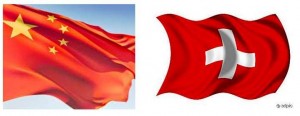 Businesses in Switzerland selling to China as well as Chinese-registered Swiss companies who import or export to Asia have received a landmark boost as a pivotal free trade agreement between the two countries commences. Under the new agreement, both countries are cutting their import tariffs to boost bilateral trade, as well as reducing red tape over customs procedures. Dispute resolution and intellectual property issues between the two countries are also being simplified, to speed up trade.
Businesses in Switzerland selling to China as well as Chinese-registered Swiss companies who import or export to Asia have received a landmark boost as a pivotal free trade agreement between the two countries commences. Under the new agreement, both countries are cutting their import tariffs to boost bilateral trade, as well as reducing red tape over customs procedures. Dispute resolution and intellectual property issues between the two countries are also being simplified, to speed up trade.
China has said it will eliminate tariffs on 84 per cent of Swiss imports under the new agreements, either straight away or within the next decade. Chinese buyers of imported Swiss products can consequently expect higher affordability on a range of items, such as: cheese, luxury watches, chemicals and machinery. Switzerland, for its part, is removing tariffs on nearly 100 per cent of its Chinese imports: including textiles, agricultural products and industrial goods.
Analysts say the landmark trade agreement will provide enormous benefits to Swiss SMEs in China, and for Chinese companies in Switzerland. They predict China will consequently overtake Germany as Switzerland’s largest export market by 2035.
Within Europe, only Iceland has held a Free Trade Agreement with China. The governments of China and Iceland recently abolished tariffs on the majority of goods traded between the two nations, including Icelandic exports of ferro-silicon and seafood.
China is the biggest importer of Swiss industrial goods in Asia, and Switzerland’s third most important trading partner with bilateral trade between China and Switzerland reaching US$23bn in 2013. And last month, a bilateral agreement on labour and employment cooperation between China and Switzerland was reached, in a bid to significantly promote economic growth and development.
However, the Free Trade Agreements between Iceland and China, and Switzerland and China have not been without teething troubles. Complex negotiations between all parties began as early as 2006, only to be dropped in 2009, before being resurrected in 2012. Following two further rounds of talks, terms were settled in January.
China hopes its initial two agreements with Europe will provide a testing ground to allow it to develop a wider FTA with Europe as a whole, after securing a promise from the European Union to review plans for a China-EU free trade agreement, earlier this year. With bilateral trade valued at more than US$1.4bn daily, the European Union is China’s largest single trading partner.
 Source: Worldbox
Source: Worldbox






















